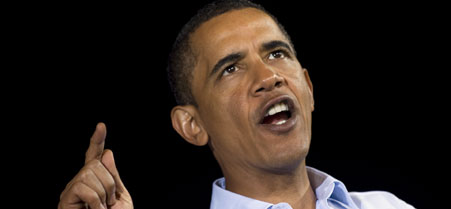Report gives Obama administration mixed review on secrecy practices
White House receives high and low marks for transparency memo, seeking input on classification policy and for its overhaul of stimulus tracking Web site, open government group says.
 The study lists qualitative examples of the president's "promising" policies, as well as "discouraging" practices.
The study lists qualitative examples of the president's "promising" policies, as well as "discouraging" practices.
An annual report card that measures the level of secrecy in the White House describes a mixed performance by President Obama in upholding his promise of unprecedented transparency.
The analysis, released on Tuesday and written by Openthegovernment.org Director Patrice McDermott and Program Associate Amy Fuller Bennett, notes there are not yet enough quantitative indicators to compare the level of secrecy in the Obama administration with the amount of stealth in the Bush White House. Instead, the study lists qualitative examples of Obama's "promising" policies and, in some instances, "discouraging" practices, the authors said.
On the positive side, Obama marked his first day on the job with memos directing agencies to rely on technology to create a more open government and to administer the Freedom of Information Act with a bias toward disclosure. The Food and Drug Administration established a task force in June to develop recommendations for enhancing the transparency of the agency's drug approval process. And an advisory board, on behalf of National Security Adviser James Jones, held a summer online forum to seek input on revisions to the executive order governing classified national security information.
In addition, the Federal Communications Commission has started an open, multimedia dialogue to design a plan for expanding high-speed Internet access. Workshops with stakeholders, including industry, advocacy groups and community organizations, are hosted online and the public is encouraged to post questions online, live.
"I think it's a great step in the right direction. And their motives are pure. They are experimenting with ways to bring more voices into the commission," said Ben Scott, policy director at Free Press, a nonpartisan organization that promotes independent media ownership and universal access to communications.
But an effort to involve the public in crafting a directive on open government generated concerns about "transparency theater," the report stated. The administration sought ideas and feedback on Obama's January memo through various new media channels, but has yet to produce any results.
"Obama's open government directive process was an innovative experiment in soliciting public participation in the policymaking process: This first use has produced mixed results," the report noted. "A number of nonprofit organizations are evaluating the process with the goal of helping the administration hone the 'tools and rules' it uses to engage the public online."
At the end of the online dialogue aimed at brainstorming revisions to classification policy, the public had no sense of what would be included in Jones' recommendations to the president, the analysis stated. A consortium of open government advocates urged Jones to release the exact language of his proposed changes for public comment before delivering the revisions.
In a Sept. 2 letter to McDermott, who was one of the advocates involved, Jones said the language would not be disclosed publicly before going to the president. "It is essential to preserve the confidentiality of the president's deliberative process regarding these complex issues that stem from the president's constitutional authority to protect the national security," the letter stated. "For that reason we cannot agree to make public a highly deliberative draft containing recommended changes in the order."
Jones added that once the revisions are made, he plans to invite the open government community to share ideas for "a more fundamental transformation" of the security classification system.
The secrecy study also covered fiscal accountability. The government is working to overhaul Recovery.gov, the official site tracking the stimulus spending. But after the makeover, the site still will have limitations that prevent the stimulus program from being a model for fiscal transparency, the report card noted. For example, under the Recovery Act and current federal guidance, not all subcontractors that receive stimulus money are required to report on how the money is spent.
There "was a sense of euphoria early on" that was spurred by Obama's post-inaugural statements on open government and FOIA, said Steven Aftergood, a member of the Opengovernment.org steering committee and director of the Project on Government Secrecy at the research group Federation of American Scientists. That elation "has been followed by a certain deflation as we see that changes are only coming quite slowly. . . . The reality is always different than what one imagines it might be, but it's not over. And there is still reason to work."
White House spokesman Nick Shapiro responded, "The administration has already taken unprecedented steps to restore a new level of openness to government. Just last week, the president announced that for the first time in history, records of White House visitors will be made available to the public on an ongoing basis. This comes on the heels of a host of other initiatives designed to make this administration the most transparent in history not only by opening the doors of the government to more Americans, but by shining a light on the business conducted there."
NEXT STORY: Huh? Air Force Blocks Pentagon Channel






